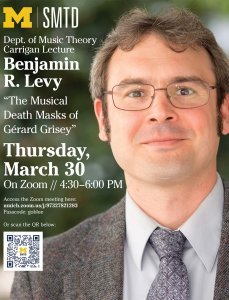Presented By: School of Music, Theatre & Dance (SMTD)
“The Musical Death Masks of Gérard Grisey,” Benjamin R. Levy
On Zoom

A Carrigan Lecture presented by the Department of Music Theory
Access the Zoom meeting: https://umich.zoom.us/j/97327821283Meeting ID: 973 2782 1283Passcode: goblue
Download Poster PDF
The Musical Death Masks of Gérard Grisey
Obituaries and official remembrances of the composer Gérard Grisey (1946-98), tend to emphasize his fascination with sound, study of acoustics, and the focus on temporal process in his music. In many ways they stay close to the composer’s own rhetoric, especially in his early manifestos propounding these very features as the aesthetic foundation of spectralism, declaring, “we are musicians and our model is sound” (Grisey 1984, 22). But what can we learn from musical tributes written in his memory? In this paper, I analyze a set of three musical remembrances of Grisey that show different sides of his compositional persona: Philippe Hurel’s Tombeau in memoriam Gérard Grisey (1999), György Ligeti’s Hamburg Concerto (1998/99, revised 2002), and Kaija Saariaho’s Message pour Gérard (2000). At first glance, these works are remarkable for their differences, representing varied personal connections to the composer himself and a wide range of strategies to emphasize certain musical features as essential parts of his legacy. Upon closer examination, however, they also reveal an unexpected through line, all referencing Grisey’s fascination with non-western musical traditions, including those of Southeast Asia, Oceania, and Central Africa. Grisey’s latent multiculturalism is often ignored or relegated to a fleeting aside in his obituaries, but once brought to light, it raises questions about the full range of Grisey’s creative thought and his theoretical work, as well as about spectralism’s place in the political landscape of post-1968 France and the ways in which this musical movement took shape and spread in its influence and scope.
Benjamin R. Levy is an Associate Professor of Music Theory at the University of California, Santa Barbara. His research interests focus on modernist and contemporary music and on connections between music, literature, and the arts. He has published widely on the music of György Ligeti, including the monograph Metamorphosis in Music: The Compositions of György Ligeti in the 1950s and 1960s. He is currently working topics related to the interdisciplinary contexts of spectral music as well as on English translations of The Schoenberg-Webern Correspondence: Selected Letters, for inclusion in Oxford University Press’s series, Schoenberg in Words.
Access the Zoom meeting: https://umich.zoom.us/j/97327821283Meeting ID: 973 2782 1283Passcode: goblue
Download Poster PDF
The Musical Death Masks of Gérard Grisey
Obituaries and official remembrances of the composer Gérard Grisey (1946-98), tend to emphasize his fascination with sound, study of acoustics, and the focus on temporal process in his music. In many ways they stay close to the composer’s own rhetoric, especially in his early manifestos propounding these very features as the aesthetic foundation of spectralism, declaring, “we are musicians and our model is sound” (Grisey 1984, 22). But what can we learn from musical tributes written in his memory? In this paper, I analyze a set of three musical remembrances of Grisey that show different sides of his compositional persona: Philippe Hurel’s Tombeau in memoriam Gérard Grisey (1999), György Ligeti’s Hamburg Concerto (1998/99, revised 2002), and Kaija Saariaho’s Message pour Gérard (2000). At first glance, these works are remarkable for their differences, representing varied personal connections to the composer himself and a wide range of strategies to emphasize certain musical features as essential parts of his legacy. Upon closer examination, however, they also reveal an unexpected through line, all referencing Grisey’s fascination with non-western musical traditions, including those of Southeast Asia, Oceania, and Central Africa. Grisey’s latent multiculturalism is often ignored or relegated to a fleeting aside in his obituaries, but once brought to light, it raises questions about the full range of Grisey’s creative thought and his theoretical work, as well as about spectralism’s place in the political landscape of post-1968 France and the ways in which this musical movement took shape and spread in its influence and scope.
Benjamin R. Levy is an Associate Professor of Music Theory at the University of California, Santa Barbara. His research interests focus on modernist and contemporary music and on connections between music, literature, and the arts. He has published widely on the music of György Ligeti, including the monograph Metamorphosis in Music: The Compositions of György Ligeti in the 1950s and 1960s. He is currently working topics related to the interdisciplinary contexts of spectral music as well as on English translations of The Schoenberg-Webern Correspondence: Selected Letters, for inclusion in Oxford University Press’s series, Schoenberg in Words.